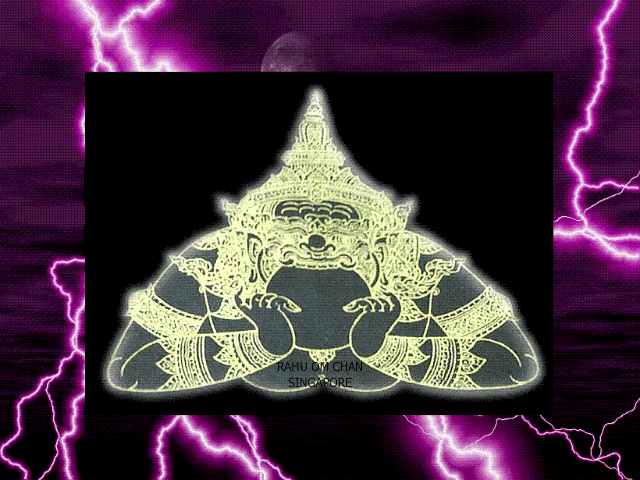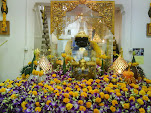When the moon underwent a partial eclipse on July 5, you may not even have noticed.
Many young Khmers, too, went on with their daily lives as if nothing was happening
But for many older Cambodians, especially those in the countryside, the implications are far reaching. They believe that the night time lunar eclipse that occurred on July 5 between 8.30 and 10.57pm may shape their lives for months to come.
The scientific explanation of an eclipse is an obscuring of light from one heavenly body by another. A lunar eclipse occurs when the earth blocks the sun's light from the moon.
But in Khmer, the eclipse of the moon is called Rahu Chab Chann. Rahu (pronounced Reahou in Khmer) is the king of all demons and evils, chann means moon and chab means to catch or swallow.
Rahu appears in both Brahmanist and Buddhist legend.
Rahu, or Rahu a'surin, rides through the sky on a silver chariot. Rahu is a being which exists like a mask _ he has no body, just a head with round bulbous eyes, a human or sometimes a lion's nose, and claw-like hands.
Rahu causes eclipses by seizing and swallowing the sun and the moon. They eventually reappear from inside his throat, thus ending the eclipse, but the battle is never ending and Rahu immediately resumes his quest to eat the sun and moon once more.
His picture is commonly found over the lintels of both Hindu and Buddhist temples.
One of the most striking portrayals of this powerful spirit can be seen in Takeo Province, on the old concrete portico of Banteay Trav Pagoda, on National Road 2, just between Tonle Bati Resort and Phnom Tamao Zoo, about 30 km south of Phnom Penh.
Rahu serves a protector of the temples. His picture is also often found above doorways of traditional Khmer houses, as a reminder of his terrible powers and to protect the inhabitants. What better way to keep the ordinary demons and devils from the door than to have their king sitting above the doorway?
To traditional Khmers, the eclipse is a time of mixed emotions. On the one hand, it is terrible to see the moon or sun devoured by a demon, perhaps never to return. On the other, the length of the eclipse can signal good harvests to come or bad. Believers in the power of Rahu and eclipses says "There are three ways to read an eclipse,"
"If Rahu swallows the moon but quickly spits her out, we believe that farmers will enjoy a very good harvest of rice and secondary crops.
"We will have a moderate harvest when there is Chann kreas chamhieng the moon is swallowed by Rahu but then bursts of his left or right rib. The last one is a poor fate. The farmers will suffer and reap a poor harvest whenever they observe that Rahu is so hungry he swallows the whole moon straight down his throat and then just defecates her."
When they observe an eclipse happening, many Khmers start to make as much noise as possible, banging on pots and pans, hitting farming implements against trees whatever it takes to draw Rahu's attention."We would cheerfully shout 'Juoy Lauk! Juoy Lauk,' which means 'help the moon'!" he said. "By requesting Rahu not swallow the moon, we believed he would not eat it all and leave plenty of fruits and agricultural products to us human beings."
"Rahu chab chann can be also called chann kreas. When we say monus kreas kanlang pee kamneut, it means a person is born half crazy after his soul was kidnapped by a demon," she said.
She said many people still believed that this was a great risk around the time of a lunar eclipse if they watch the eclipse.
"To prevent this, a pregnant woman should place an ak kambor (a small silver or copper box with a conical top used to hold lime for betel nut chewing) in her tnoak sampot (the pleat hanging from the knot of a Khmer skirt) at the time of a lunar eclipse. This will protect her baby from being kidnapped by the demons."
Those building homes during an eclipse must take care, too.
If construction of a house is not yet complete when a lunar eclipse occurs, villagers believe they must tie sbov pleing (a kind of roof thatching plant with large leaves (in Latin, rottbelia exaltata) to the main rafter of the roof because demons are afraid of sbov pleing.
Though they live in modern world, many Khmers believe the planets influence their daily life. Most farmers still stand staunchly by traditional observations and rituals, such as the lunar eclipse, and predictions gleaned from the Royal Ploughing Ceremonies and Water Festival.
Even today, Khmers build temples and houses based on their knowledge of astrology to determine auspicious sites and other factors of importance.
Belief in Rahu is an example of intangible heritage. If the locals think such a practice is helpful to their daily life, let us help to rehabilitate and promote it.
Source: Leisure Cambodia July-August, 2001 Vol 1 No.3
Wednesday, 18 June 2008
Subscribe to:
Post Comments (Atom)


No comments:
Post a Comment